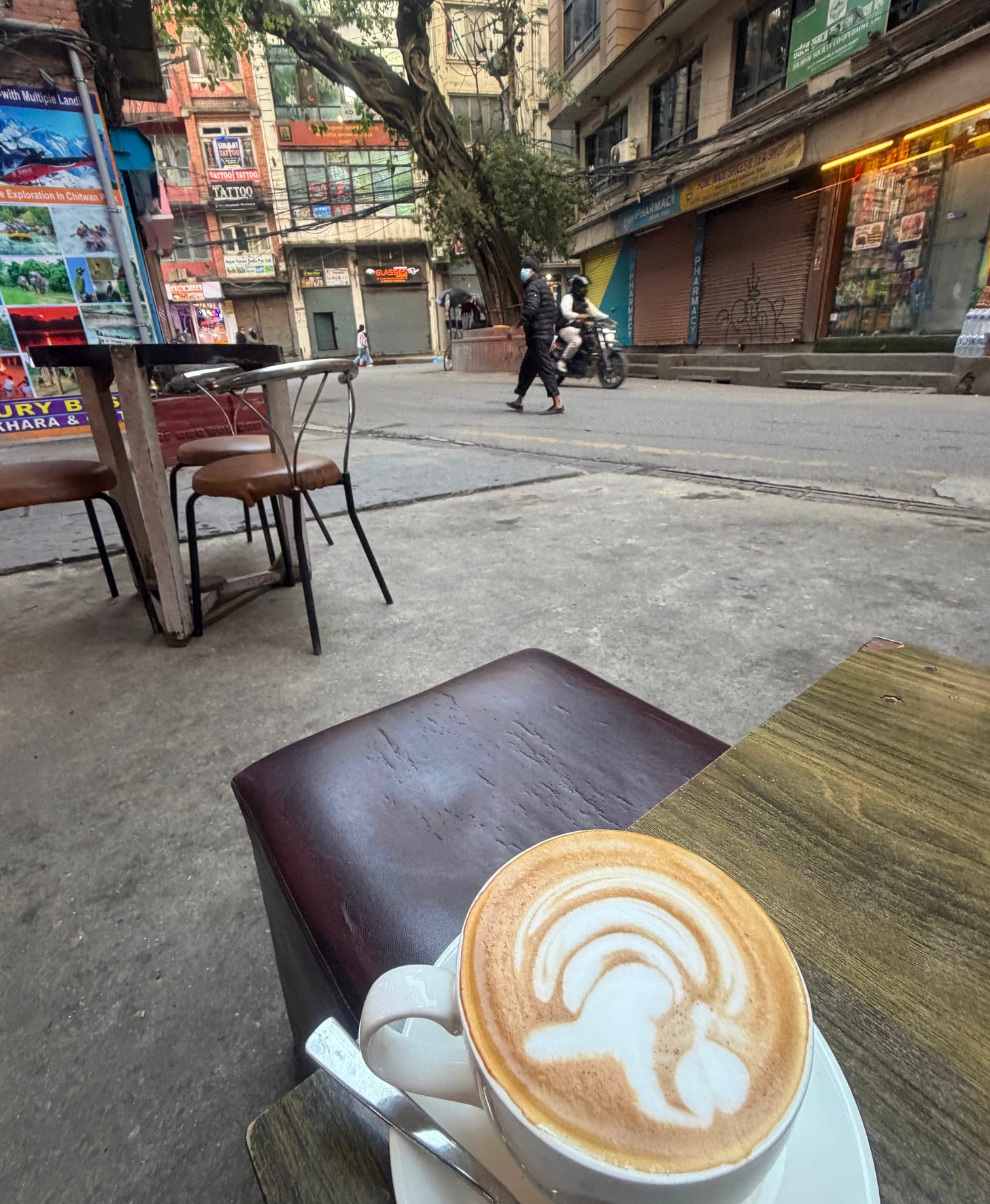Remakes, reboots, and the real work of letting go
Three lessons from Kathmandu on nostalgia, effortlessness, and re-engineering results.
Namaste from Kathmandu, Nepal.
I arrived last night and, after a few hours of sleep, I’m writing this from a café, watching the city wake up and sipping a delicious cappuccino (pictured above).
Sharing a few observations from the trip so far:
The more things change, the more we crave the familiar
I flicked on the Singapore Airlines in-flight entertainment and saw a category of movies called “Remakes and Reboots.”
Out of all the new flicks on offer yesterday, I chose to watch Ace Ventura again (so funny). My Spotify playlists mainly feature songs I was dancing to in my 20s. I think Stranger Things is so popular because of the 80’s throwbacks.
I remember going for a walk with Julian Mather earlier this year. Julian writes and speaks professionally on Changeability. I’ll never forget what he said on that walk:
“Don’t you notice, the more change there is, the more we like to cling onto the familiar?”
How are you accommodating the new while still giving your team, or clients a sense of the familiar?
I was talking to a friend whose company used to host an annual conference filled with rituals and traditions.
After being acquired, she wants to reinvent how they all gather together, but also honour some of the traditions and throw back to some of the familiar. There’s something powerful in that balance.
Two-speed
If you listen to any tech influencer, you’ll hear them talk about how our jobs and livelihoods are going to be disrupted by AI.
At the same time, you board an aircraft and they’re still using the 2-prong earphone jacks from the 1980s.
Yes, the pace of change is accelerating, but it’s also wild how some things remain exactly the same.
Letting go
I started reading Letting Go by David R. Hawkins on my flight (yes, yes, I’ll start reading fiction soon!), and wanted to share some quotes with you:
“It is often beneficial to look at some commonly held beliefs and let go of them right in the beginning, such as:
We only deserve things through hard work, struggle, sacrifice and effort.
Suffering is beneficial and good for us.
We don’t get anything for nothing.
Things that are very simple aren’t worth much.
That quote reminded me of a piece from Dan Koe, The Problem of the 40-Hour Work Week, which relates beautifully to the above:
“A pattern I’ve noticed in successful people (who didn’t sacrifice their life for success) is that they physically worked very little, yet people see them as hard workers. Mentally, they were always thinking, plotting, and scheming. They worked in their mind. And once they were clear on their idea, they executed with speed that others couldn’t compete with.
The new status symbol, in my eyes, is the ability to achieve more, in less time, and make it seem effortless. People shouldn’t believe you when you tell them that you only work 3–4 hours a day.”
It’s really tough to break that assumption that more time = more value.
I often have a great talent for making things harder than they need to be.
But I also think that processing time while I’m walking, driving, or reading is so powerful. It’s the part that allows me to execute/land the plane at speed because the hard part (the thinking, the scheming, the decision) has already crystalised in my mind.
Another tip: Focus on the result you want to create first - and then reverse-engineer the most efficient, easiest way to get there.
On goal-setting
From David R Hawkin’s Letting Go again:
“If I let go of my desires, then I won’t get what I want.”
Actually, the opposite is true. Desire, especially strong desire, frequently blocks us from getting what we want. This is because desire literally means, ‘I do not have.’ In other words, if we say that we desire something, we are saying that it isn’t ours. When we say it isn’t ours, we put a psychic distance between ourselves and what we want. This distance becomes the obstacle that consumes energy.
Write down your personal goal and let go of your desire for it. It seems paradoxical, but that is the process: identify the goal, and then let go of wanting it.”
Rather than set goals and write down why I want them so badly, just pay attention to ANYTHING that can complete this sentence, “Wouldn’t it be cool if…”
I just find that’s a lighter, easier way to have some focus and a target, without holding onto it and controlling the outcome.
Thanks for reading while I’m on the other side of the world.
You can stay posted on more of the daily trip updates on this blog, Instagram, or tuning into my podcast, Leanne on Demand.
🌴
Leanne “Alrighty then” Hughes
p.s. If you nodded along (or smiled at the Ace Ventura reference), hit that heart 💙below - it keeps these ideas flowing forward.




Without being a Debbie Downer (Sad Steph?) this nostalgia / clinging onto the past is literally why conservatism is having such a moment and has such a grip on people. Too much change that feels threatening to historic power dynamics = try and revert back to what ‘was’ (even when more often than not, this idea/ideal of the past isn’t even real).
Side note; the modern phenomenon of ‘anemoia’ or a nostalgia for a time you never knew is so fascinating (and understandable). Someone was telling me just the other day about their 16 year old making them a 20 minute vlog about how lucky the mum was to grow up in a time before the internet / phones, and surrounded by such seminal and brilliant music. But also it’s not like the 80s/90s/00s weren’t exactly problem free.
Enjoy this adventure. And keep reading non fiction!